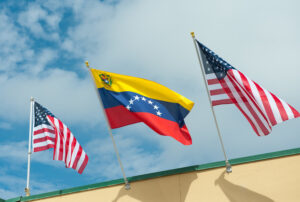Due to years of mismanagement and corruption on the part of the government of Nicolas Maduro, Venezuela was already in the midst of an acute economic crisis before U.S. economic sanctions were first imposed. But the U.S. financial sanctions imposed in August 2017 and the oil sanctions imposed in January 2019 are accelerating the country’s economic meltdown and exacerbating what was already a dire humanitarian crisis.
On July 23, WOLA Director for Drug Policy and the Andes John Walsh testified before the Tom Lantos Human Rights Commission on the humanitarian impact of U.S. economic sanctions, while also providing recommendations for a path forward. As Walsh made clear in his remarks, the only viable path out of Venezuela’s crisis is a negotiated process that leads to free and fair elections, in which Venezuelans can once again choose their own leaders.
WOLA believes that sanctions can usefully provide a non-violent form of pressure. But such targeted pressure needs to be paired with engagement to promote peaceful solutions rather than generating indiscriminate harm to the population to somehow force a sudden “regime change.” Any sanctions imposed against the Maduro government should be with a view to providing incentives for meaningful negotiations—such as the talks now underway with Norway’s mediation.
Given Venezuela’s near-total reliance on oil for its national income and the already dramatic deterioration in the country’s oil production, the unrelenting imposition of U.S. financial and oil sanctions can be expected to decimate Venezuela’s economy, with ever more severe impacts on the lives of millions of ordinary Venezuelans.
In his remarks to the Tom Lantos Human Rights Commission, Walsh urged that steps be taken to alleviate the harms that U.S. sanctions inflict upon ordinary Venezuelans. First, the Trump administration can flexibilize existing sanctions and implement alternative approaches, such as an oil-for-food model, to help ensure that the population receives the resources it needs.
Second, U.S. officials should put ending the oil sanctions and easing other targeted sanctions on the table to help achieve a negotiated solution to Venezuela’s crisis. The Trump administration should offer sanctions relief in exchange for significant and verifiable commitments made by the Maduro government at the negotiating table.


